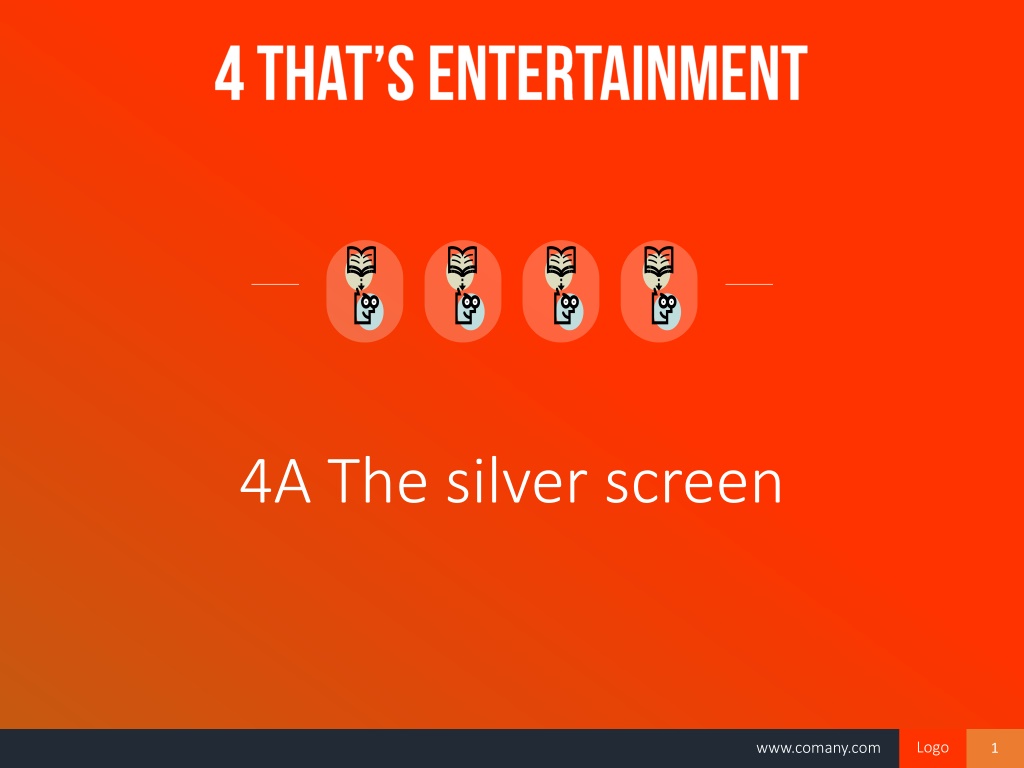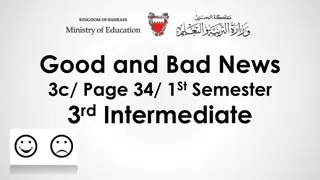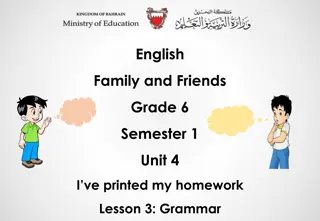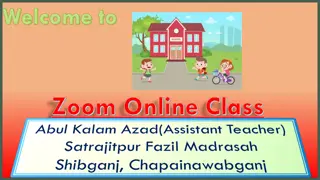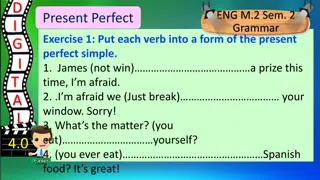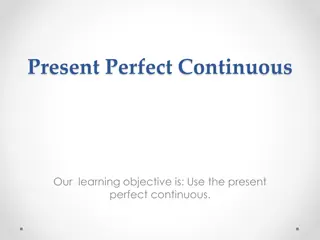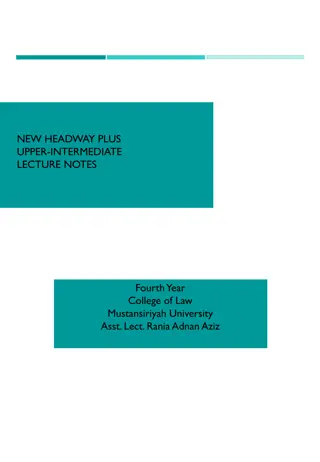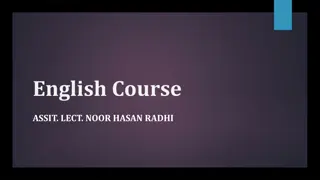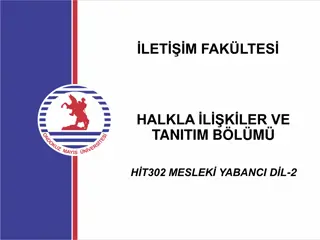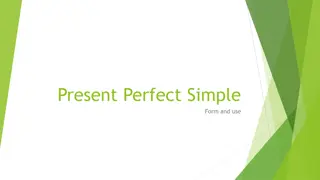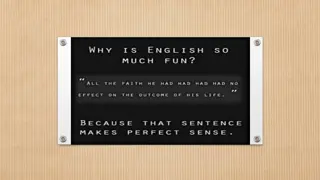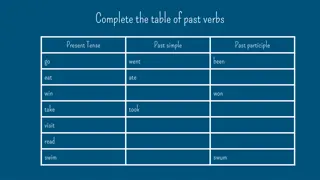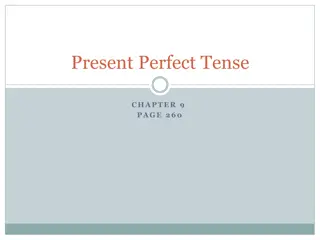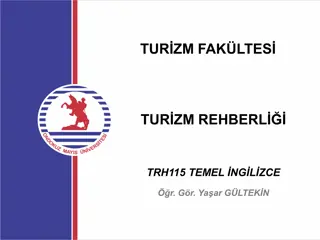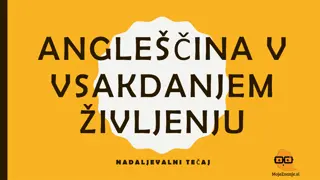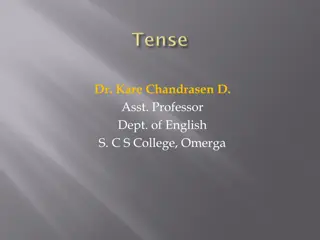Understanding the Present Perfect Tense in English Grammar
Explore examples of using the present perfect tense in English grammar, including how to discuss experiences, use of "never" and "ever," and distinguishing between past simple and present perfect. Learn how to correctly form sentences and ask questions in the present perfect tense.
Download Presentation

Please find below an Image/Link to download the presentation.
The content on the website is provided AS IS for your information and personal use only. It may not be sold, licensed, or shared on other websites without obtaining consent from the author. Download presentation by click this link. If you encounter any issues during the download, it is possible that the publisher has removed the file from their server.
E N D
Presentation Transcript
4A The silver screen Logo www.comany.com 1
A love story = romance A romantic comedy Historical drama Cartoon Logo www.comany.com 2
What kind of film is it? (the type of film) Whose in it? ( the actors) What s it bout. (the plot/the story of the film) What s it like (the person s opinion of the film) Logo www.comany.com 3
Logo www.comany.com 4
Logo www.comany.com 5
Logo www.comany.com 6
Logo www.comany.com 7
Logo www.comany.com 8
https://www.e-grammar.org/download/list-of- irregular-verbs.pdf Na ite na ovom sajtu. Logo www.comany.com
Logo www.comany.com 10
Logo www.comany.com 11
Logo www.comany.com 12
Examples I have been I have been to Indonesia. She hasn t eaten She hasn t eaten sushi. Have you seen Have you seen Big Ben? Remember! We can use the present perfect to talk about experiences in our life. We often use never never for negatives and ever ever in questions. My brother has met My brother has met his favorite singer. I have never seen I have never seen an alien! Have you ever climbed Have you ever climbed the Eiffel Tower? Be careful! If you say when your experience was, we use the past simple. If you ask for extra information about someone s experience, we also use the past simple. I ve been I ve been to India. I went wentthere two years ago. Did you like Did you like it? Yes, it was it was very interesting! We say... We don t say... My grandma has visited many countries. (NOT My grandma visits many countries.) We have never tried pizza with chocolate. (NOT We never tried pizza with chocolate.) Have you ever given your teacher a present? (NOT Have you ever gave your teacher a present?) Logo www.comany.com 13
Logo www.comany.com
Logo www.comany.com
Logo www.comany.com
Logo www.comany.com 17
Stating an opinion Stating an opinion In my opinion... The way I see it... If you want my honest opinion.... According to Lisa... As far as I'm concerned... If you ask me... Asking for an Asking for an opinion opinion What's your idea? What are your thoughts on all of this? How do you feel about that? Do you have anything to say about this? What do you think? Do you agree? Wouldn't you say? Logo www.comany.com 18
Expressing agreement Expressing agreement I agree with you 100 percent. I couldn't agree with you more. That's so true. That's for sure. (slang) (slang) Tell me about it! You're absolutely right. Absolutely. That's exactly how I feel. Exactly. I'm afraid I agree with James. I have to side with Dad on this one. No doubt about it. (agree with negative statement) (agree with negative statement) Me neither. (weak) (weak) I suppose so./I guess so. You have a point there. I was just going to say that. Logo www.comany.com 19
Expressing disagreement Expressing disagreement I don't think so. (strong) (strong) No way. I'm afraid I disagree. (strong) (strong) I totally disagree. I beg to differ. (strong) (strong) I'd say the exact opposite. Not necessarily. That's not always true. That's not always the case. No, I'm not so sure about that. Logo www.comany.com 20
Interruptions Interruptions Can I add something here? Is it okay if I jump in for a second? If I might add something... Can I throw my two cents in? Sorry to interrupt, but... (after accidentally interrupting someone) (after accidentally interrupting someone)Sorry, go ahead. OR OR Sorry, you were saying... (after being interrupted) (after being interrupted) You didn't let me finish. Settling an argument Settling an argument Let's just move on, shall we? Let's drop it. I think we're going to have to agree to disagree. (sarcastic) (sarcastic) Whatever you say./If you say so. Logo www.comany.com 21
Uraditi Review 4, strana 35 Logo www.comany.com 22
Choose the correct adjective: 1. My nephew was (amusing / amused) by the clown. 2. It s so (frustrating / frustrated)! No matter how much I study I can t seem to remember this vocabulary. 3. This lesson is so (boring / bored)! 4. I m feeling (depressed / depressing), so I m going to go home, eat some chocolate, and go to bed early with a good book. 5. I thought her new idea was absolutely (fascinated / fascinating). 6. This maths problem is so (confusing / confused). Can you help me? 7. The teacher was really (amusing / amused) so the lesson passed quickly. 8. The journey was (exhausting / exhausted)! Twelve hours by bus. 9. The plane began to move in a rather (alarming / alarmed) way. 10. He was (frightening / frightened) when he saw the spider. 11. I was really (embarrassing / embarrassed) when I fell over in the street. 12. That film was so (depressing / depressed)! There was no happy ending for any of the characters. 13. I m sorry, I can t come tonight. I m completely (exhausting / exhausted). 14. We are going in a helicopter? How (exciting / excited)! 15. Don t show my baby photos to people, Mum! It s so (embarrassing / embarrassed)! Logo www.comany.com 23
THANK YOU THANK YOU Logo www.comany.com 24
